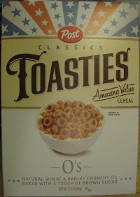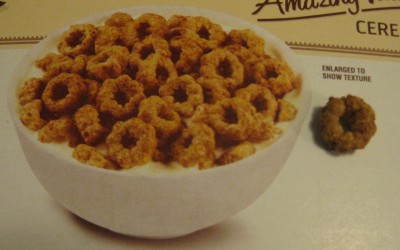Actual Size
Jan
17
2011
 I tried a new cereal the other day: Post Toasties. I forget where I picked it up, but I haven’t tried to find it again.
I tried a new cereal the other day: Post Toasties. I forget where I picked it up, but I haven’t tried to find it again.
This isn’t a review of the cereal itself (think “inflated grape nuts”), but rather of something I noticed on the box.
In the US, all food products are required to list the nutrition information. I believe that a corollary to that law is that all cereal boxes are required to show a bowl of the cereal with milk (fruit garnish optional).
Let’s zoom in on the standard disclaimer:

No big deal, right? Every box of cereal says “enlarged to show texture”.
Wrong! Well, every box may say that, but that doesn’t mean that it’s right.
I started eating the cereal and discovered that the cereal’s claims were incorrect. The photo on the box was not enlarged to show texture. In fact, the picture showed the cereal smaller than it actually was.
Unfortunately for me, I now know that I won’t be able to win any money for deceptive advertising because it may be an obvious unilateral mistake. Plus I wasn’t really affected by it.
Oh well.
It’s actual size, but it seems much bigger to me.
saying, “When will the new moon be over, So that we may sell grain, And the sabbath, that we may open the wheat market, To make the bushel smaller and the shekel bigger, And to cheat with dishonest scales,
Amos 8:5




This little article thingy was written by Some Guy sometime around 11:55 pm and has been carefully placed in the Marketing category.

 This is Alpha, the first-born, when he was 2YO.
This is Alpha, the first-born, when he was 2YO. This is Beta, the second-born, when he was about 2YO.
This is Beta, the second-born, when he was about 2YO. This is Gamma, the third-born, when he was about 18MO.
This is Gamma, the third-born, when he was about 18MO.




January 18th, 2011 at 9:06 am
This is why I just have coffee for breakfast.
January 20th, 2011 at 9:53 pm
I can’t be bothered to do any real research on this, but I think deceptive advertising would be different from a simple unilateral mistake. A unilateral mistake is just that – a mistake. The old contract principle says that you can’t advantage of an obvious mistake, but I believe it needs to be a genuine mistake. If a seller is deliberately trying to mislead a consumer, he shouldn’t be protected by that principle. Then you’re probably into some kind of fraud.
But you are correct – if you aren’t affected by it (meaning, no actual damages), you are likely to be awarded only nominal damages and an injunction. I do think most fraud statutes allow for punitive damages, which means you could win something even without actual damages. But these are all just academic concepts; I have no experience in consumer or contract law. So results may vary, depending on your jurisdiction.
I realize your post is about circles, but just to contrast, squares are in fact actual size, despite how they appear in a rear view mirror.